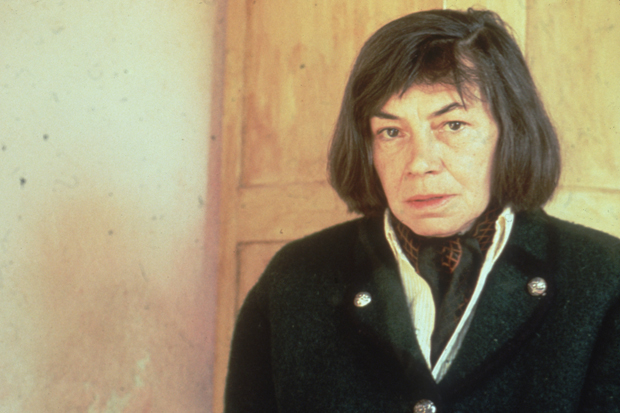Philip Kerr is best known for his excellent Bernie Gunther series about a detective trying to survive with his integrity more or less intact in Nazi Germany. His latest novel, however, is a standalone thriller set in literary territory that might have appealed to Hitchcock. Research (Quercus, £18.99, Spectator Bookshop, £15.99) opens with the murder of the beautiful Irish wife of one of the world’s bestselling novelists in the couple’s luxurious Monaco apartment. Her husband, John Houston, has disappeared. He is the prime suspect.
Houston researches and plans his thrillers but employs an ‘atelier’ of jobbing novelists to do the hard grind of writing what he describes as ‘books for people who have never read them before’. Now on the run for a murder he says he did not commit, he turns for help to his trusted ally, Don Irvine, chief among his literary henchman. The narrative switches between the viewpoints of these two men — both skilled plotters, adept at making things up.
Much of the book moves slowly, especially at first. There are ponderous ruminations on writing and the book trade, interspersed with gourmet meals, high-performance cars, glamorous women, 500-euro bottles of wine and the occasional corpse. Stick with it. Kerr steadily builds a dizzyingly improbable and highly entertaining edifice of plot and counterplot. The reader should suspend belief and remember that, as Irvine remarks with the barbed accuracy that is a hallmark of the novel, ‘Being a writer is a kind of elegant sociopathy.’
Alternating narratives are also a feature of Sabine Durrant’s second psychological thriller, Remember Me This Way (Mul-holland Books, £14.99, Spectator Bookshop, £12.99). Lizzie, a school librarian, drives from London to Cornwall on the anniversary of her husband’s death to put flowers on the spot where he died in a car accident. She is shocked to find fresh flowers already there. Her unease grows when she discovers signs of an intruder in the bungalow they used as a holiday home. Lizzie had written to Zach, her husband, to propose a trial separation; she’s haunted by the possibility that her letter caused his suicide or disappearance.
The second narrative, set a few years earlier, is Zach’s diary of his courtship of Lizzie; it’s a psychopath’s record of the careful manipulation of his next victim. Except it isn’t quite as simple as that: what happens when, despite his worst intentions, a psychopath starts to fall into something suspiciously like love?
Durrant combines these strands into a claustrophobic story of obsession streaked with paranoia. The central question is whether Zach is still alive. Lizzie’s pursuit of the truth leads to a set of much more complicated questions. If, in the end, some of the answers seem contrived, it is a small price to pay for such a creepy and emotionally acute novel.
Different and still darker pleasures characterise Stuart Neville’s latest novel, The Final Silence (Harvill Secker, £12.99, Spectator Bookshop, £11.69). Set in Northern Ireland, it takes up the story of Detective Inspector Jack Lennon, the sort of scarred maverick cop-with-a-heart who appears in so many urban noir series. Lennon stands out, however, not because he differs significantly from the template but because he’s coloured by Belfast’s bitter sectarian legacy.
When a niece clears out the house of her dead uncle, she finds a leather-bound album containing fingernails and locks of hair taken from murder victims over two decades. Her father, a rising Unionist politician, would like to suppress the album but his daughter refuses. This triggers a series of violent events that draws in Lennon and his would-be Nemesis, DCI Serena
Flanagan, a woman nursing her own problems. Crisply written and fast-moving, the novel has a brutal honesty that confirms Neville’s place in the first division of crime writers.
Deon Meyer’s Captain Benny Griessel returns with Cobra (Hodder & Stoughton, £18.99, Spectator Bookshop, £16.99). Benny is still with the Hawks, the elite investigation unit of the South African Police Service. Two men from a private security company are murdered in a vineyard guesthouse, along with a servant. Their charge, a wealthy Briton with a mysterious need for protection, has vanished. The British Consulate says his passport is a forgery and is uncharacteristically uncooperative. In a parallel development, a young professional pickpocket who is funding his sister’s university education steals a wallet containing an encrypted memory card. The investigation points the police in the direction of a Cambridge computer scientist whose latest work concerns the tracing of shady financial transactions.
Cobra rattles along at a pleasing rate. When they come, the violent episodes have real impact. The ending is perhaps a little rushed, but that is a small flaw in a novel that’s never less than readable. The South African setting is a major part of the appeal. Best of all, however, is Bernie himself, a humane recovering alcoholic riddled with self-doubt, and his interaction with his family, friends and colleagues. Long may he survive.
Got something to add? Join the discussion and comment below.
Get 10 issues for just $10
Subscribe to The Spectator Australia today for the next 10 magazine issues, plus full online access, for just $10.
You might disagree with half of it, but you’ll enjoy reading all of it. Try your first month for free, then just $2 a week for the remainder of your first year.














Comments
Don't miss out
Join the conversation with other Spectator Australia readers. Subscribe to leave a comment.
SUBSCRIBEAlready a subscriber? Log in